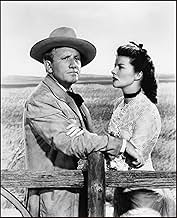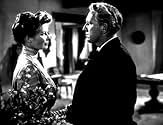VALUTAZIONE IMDb
6,3/10
2582
LA TUA VALUTAZIONE
Sulla frontiera americana, una donna di St. Louis sposa un uomo del New Mexico che viene visto come un tiranno dalla gente del posto.Sulla frontiera americana, una donna di St. Louis sposa un uomo del New Mexico che viene visto come un tiranno dalla gente del posto.Sulla frontiera americana, una donna di St. Louis sposa un uomo del New Mexico che viene visto come un tiranno dalla gente del posto.
- Regia
- Sceneggiatura
- Star
- Premi
- 3 vittorie totali
William 'Bill' Phillips
- Banty
- (as Wm. 'Bill' Phillips)
Eddie Acuff
- Cattleman
- (non citato nei titoli originali)
Henry Adams
- Gambler
- (non citato nei titoli originali)
Recensioni in evidenza
Hepburn and Tracy are woefully miscast in this ennui-inducing bore that is easily the worst of their films -- well, perhaps tied with Keeper of the Flame. The sexual tension, the battle of the sexes, that was the hallmark of their best efforts -- which were the comedies, not the dramas -- is entirely absent here. Hepburn seems uncomfortable as the naive nineteenth-century marked woman who bears her "shame" stoically and alone. Tracy, whose brilliant underplaying made him one of the masters of his craft, sleepwalks through this thing -- with the exception of the scene where his friend Doc, with his dying words, makes Tracy realize what his rigidity has cost him. The great team and their talented supporting cast are cruelly wasted in this dreary soap/horse opera.
Why do I get the feeling some folks know little about Spencer Tracy? For example, Kazan's alleged quote of "Tracy did not like horses and horses did not like Tracy either" (per Ciment's book). Excuse me, but how could a man who loved to play polo, which Tracy did and did a lot in his younger days and against studio wishes, not like horses? I've played polo and if you don't like horses (and they don't like you) you won't be playing the game more than once or twice. Maybe the quote was made for the more obvious reason: to justify Kazan turning out a movie that was below his abilities? If true that one of Kazan's excuses for the painful experience of directing the movie was not filming on location, I can't totally disagree, but then again a good many great films were not filmed on location, so this excuse only holds so much water. And how can one think that the movie is a "cattlemen vs. homesteaders" film? That's the setting, and it is the trigger of the conflict between the main characters, which leads to the betrayal, which is the center piece of the story, but that certainly isn't the movie. I grant you, it's not one of Tracy's best, but he does the best he can with the lame Marguerite Roberts' script. Even if this movie had been shot on location, it doesn't change the glaring fact that a bad script is still a bad script. If you believe Tracy was sleepwalking, then you have to also believe Kazan was on life support and Roberts was dead, from the neck up, while scripting this one. If Tracy's at fault for anything, it's for trying to save the film, which is more than it deserved.
In Michel Ciment's book " Kazan par Kazan" which is actually a very long interview (à la "Hitchcock by Truffaut"),the director recalled how painful the filming of "sea of grass " was for him:first of all,he complained for a subject like that SHOULD have been filmed on location and we can find little fault with his opinion;besides ,he had to use the Tracy /Hepburn pairing,two actors he admired but who were miscast here;"Tracy did not like horses and horses did not like Tracy either" .His wife should have been a frail young girl,which Hepburn was not :"she was clever but she was part of the high society.." The one thing Kazan seemed to appreciate was her crying;but reportedly Louis B Mayer watching the rushes complained: her tears does not flow from her eyes ,but from her nose;it looks like snot!" Among all my movies this is the one I like the least" he concludes.
With hindsight,the film retains qualities and I do not think anyway that it is worse than the disastrous "last tycoon" which IMHO,is Kazan's absolute nadir.Hindsight displays its charms.Considering the limitations Kazan was working under,it's a wonder that the scene where Hepburn and Tracy are in front of the "sea of grass" listening to the noise and to the silence (of the Buffalos -now they are gone- and of the Indians -now in the reservations-) is really poetic.We can also save the scene of the storm ,where the farmer (David) has to fight his wealthy neighbor (Goliath).The historical context ,the end of the prairie of grass and the coming of the farmers ,is interesting.
Robert Walker's character ,an unstable boy ,predates James Dean in "East of Eden" by eight years:too bad the part is underwritten.The fact that he was born of adultery is almost passed over in silence ,except for one scene or two.
It is not my Kazan's favorite or even among my favorites,but it's a film to watch if ,like me,you are interested in the director's oeuvre..
Like this? try this......
"Giant" Georges Stevens 1955
With hindsight,the film retains qualities and I do not think anyway that it is worse than the disastrous "last tycoon" which IMHO,is Kazan's absolute nadir.Hindsight displays its charms.Considering the limitations Kazan was working under,it's a wonder that the scene where Hepburn and Tracy are in front of the "sea of grass" listening to the noise and to the silence (of the Buffalos -now they are gone- and of the Indians -now in the reservations-) is really poetic.We can also save the scene of the storm ,where the farmer (David) has to fight his wealthy neighbor (Goliath).The historical context ,the end of the prairie of grass and the coming of the farmers ,is interesting.
Robert Walker's character ,an unstable boy ,predates James Dean in "East of Eden" by eight years:too bad the part is underwritten.The fact that he was born of adultery is almost passed over in silence ,except for one scene or two.
It is not my Kazan's favorite or even among my favorites,but it's a film to watch if ,like me,you are interested in the director's oeuvre..
Like this? try this......
"Giant" Georges Stevens 1955
This movie is tough to love. Partly this is due to the setting of the film (nothing but grasslands as far as the eyes can see), but most of it is because the two main characters are so flawed and unlikable. In some ways this unlikability is good, as too often Hollywood films of the 30s and 40s present people in a "black/white" fashion and people who fall somewhere towards the middle are seldom seen. However, such "gray" characters are tough to bond with or care about, so I can understand why the film makers generally avoided this. Katherine Hepburn seems like a good character through much of the film, but midway through it, she shows a self-centeredness that make it tough to really see the tragedy in her life. Her initially living with the cruel and lawless Tracy is unforgivable, but her having an affair and then leaving her kids (one the bastard) with Tracy and not seeing them for almost 20 years make her very, very tough to like. Tracy, on the other hand, does stay to care for his kids--but in a very self-serving fashion. He is an emotionally constricted and yet over-indulgent father. As a human being, he's a lot worse--killing or nearly killing farmers because he saw the plains as his own personal property. The central message that eventually these farmers contributed to the destruction of the plains is lost--Tracy's not fighting against the farmers due to any love of nature or a desire to preserve the land. No, he's just a greedy rancher that will do ANYTHING to keep the land without fences.
Despite the problems with the characters, the film is exquisitely filmed--with some of the more beautiful camera shots I've seen in a long time. This film is worth seeing, but not one I would recommend you rush to see.
Despite the problems with the characters, the film is exquisitely filmed--with some of the more beautiful camera shots I've seen in a long time. This film is worth seeing, but not one I would recommend you rush to see.
Young woman in 1880 St. Louis marries a cattle-baron who wields a powerful, occasionally unpopular and unfeeling hand. The couple settles into their New Mexico ranch-house, where she soon has a child, but the days and weeks of loneliness get to her and she shares in a flirtation with the smitten local attorney. Conrad Richter's novel becomes somewhat misbegotten vehicle for Spencer Tracy and Katharine Hepburn, though the stars do make valiant attempts to lend believability to these characters. Richter's story is full of stop-and-start melodrama, which nearly sabotages the central relationship (particularly since screenwriters Marguerite Roberts and Vincent Lawrence have given all the best dialogue exchanges to the supporting players, many of whom ultimately fare better than the leads). Melvyn Douglas works very simply with Hepburn and they have an easy rapport; Robert Walker (as the grown son Douglas fathered with Kate) brings along a nice swagger; Edgar Buchanan (as the cook) and Harry Carey (as the local doctor) have seldom been so endearing. It's difficult getting a handle on Tracy's reserved, unimpressed Colonel. Blank-faced and slack jawed, Tracy puts a great deal of thought into this complicated man but walls himself up from the audience in the process. Hepburn, in her early scenes, radiates nervous warmth and good will, but turning her into a black-wearing drudge filled with regrets was probably a mistake. Overlong, not particularly satisfying...yet the film has something. It's handsomely-made, reasonably well-paced and is certainly unusual coming from this high-powered star-duo. **1/2 from ****
Lo sapevi?
- QuizThis film was very successful at the box office, earning MGM a profit of $742,000 ($10.2M in 2023) according to studio records. This was the most profitable of all the Spencer Tracy-Katharine Hepburn MGM films.
- BlooperWhen Col. Brewton returns home from his trip after the blizzard died down, he is wearing a winter coat which is fully buttoned up right before he enters the house. But when he enters the house and is greeted by Lutie, the top coat button is unbuttoned.
- Citazioni
Brice Chamberlain: Why do women insist on loving men for what they want them to be instead of what they are?
- Curiosità sui creditiCard at beginning: This story takes place for the most part against the background of the sea of grass - that vast grazing empire which once covered the western part of north America from the great plains to the rocky mountains, and beyond.
- ConnessioniFeatured in Katharine Hepburn: All About Me (1993)
I più visti
Accedi per valutare e creare un elenco di titoli salvati per ottenere consigli personalizzati
- How long is The Sea of Grass?Powered by Alexa
Dettagli
Botteghino
- Budget
- 2.349.000 USD (previsto)
- Tempo di esecuzione
- 2h 3min(123 min)
- Colore
- Proporzioni
- 1.37 : 1
Contribuisci a questa pagina
Suggerisci una modifica o aggiungi i contenuti mancanti







































